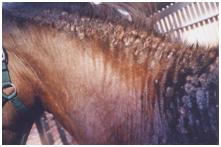Owning a horse is a very difficult and expensive time. One thing that any horse owner will tell you they require an enormous amount of care, love and attention however the rewards are significant as they incredibly loving and loyal animals. They are many health issues that confront a horse and the horse owner has to be aware of them all. A disturbing condition is Sweet Itch. Whilst this sounds benign it can cause a terrible affliction to the horse and create great discomfort to it. However, there is good news as there are proven treatments that can help prevent Sweet Itch from occurring and ease the symptoms if it is present.
So what is Sweet Itch?
Sweet Itch is a hypersensitivity that is caused by the bite of the Culicoidesmidges. It’s especially common in warmer areas of the world where these tiny fly’s breed easily. It effects all ponies and horses. The midges enjoy biting the horse for there rich blood. However, the salvia of the midges contains a harmful allergen that reacts with the horses’ immune system. This produces a skin reaction in the horse that makes it itchy and inflamed. Wherever the insects feed an allergic reaction develops. These create cuts, or lesions as they are correctly called, around the affected area. These are mainly located around the mane, tail and middle of the horse. It’s not uncommon to find them around the ears and head.
These lesions are incredibly itchy for the horse. The horse starts to rub the areas against any rough objects it can find like trees or fence posts as the stinging becomes unbearable. These can break the skin of the horse causing bleeding, broken hairs and bald patches. Not only that but the skin can become infected compounding the problem.
Whilst treatments can help make the stinging less the best way to stop Sweet Itch is to prevent it from happening at all. There are various ways that this can be done. Insecticides and repellents that kill or convince midges to move elsewhere are popular but even keeping the horse away from areas where midges gather can also help. There are also the equivalents of a mosquito nets over the stable doors or keeping the horse indoors when the midges are most active. Vaccinations are becoming available but that are not yet 100% effective.
Changes to the horses’ diet, adding linseed oil, has been suggested but is not proven and there are other alternative natural remedies available too. These use plants such as lavender or geranium and with the Aloe Vera plant helping to reduce the itching. When the symptoms are in place then antihistamines are used to slow the reaction along with steroids. The use of antibiotics is also required should there be an infection. This can mean expensive and frequent visit from the Vet.
The following article gives you some more information on Sweet Itch. https://www.purcheval.com/en/sweet-itch-cause-prevention-and-treatment-advice/

